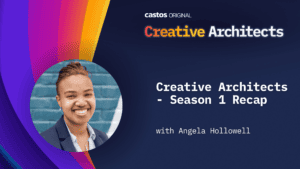In the last episode we talked about Tom Webster’s approach to using YouTube for growing your podcast.
A quick recap of that is:
- Use Youtube because it’s a powerful search tool for topic heavy podcast episodes.
- Make your show more shareable; leverage something other than audio to do that.
After shipping that episode, I felt like, while it was great I said we should be considering video — I didn’t really get into how you could that for your show. More specifically, if you’re already neck deep in producing your weekly audio show, how the heck are you going to find time to do video.
I think for a lot of us, and I’m guilty for encouraging this, the “just ship it” method is great. Grab your phone, grab your earbuds, start recording and get your content out there. Once you can start to measure your shows success, that’s when many us start investing in better audio tools. Wether that’s an upgrade to your microphone or spending $300+ on Hindenburg or a Descript subscription. Both tools, by the way, I cover on our YouTube channel, youtube.com/castos
Where am I going with this?
The novice audio creator, you and me, find ourselves tasked with creating better audio and better shows as time marches on and suddenly Edison research data says…hey, do video too!
It’s a big lift. So what can we do, the solo creator, do to help make this whole video thing easier and why?
Back to the Why for a second…
Aside form the quick key points mentioned earlier, I think it’s healthy to make your why all about the audience. Why do we want to augment audio with video? To make the experience better for the listener, give them content in a different context, and build a deeper connection. The second why is to give your podcast the opportunity to punch into the best moments of each show and get that out into the world — in video.
If you ran up to someone on the sidewalk and said “hey listen to this 45 minute long audio episode” they’d probably laugh at you. That’s what it’s like dumping your episode on to social media. But a 30 second video or audiogram clip? Much better chances.
So what type of video is the best for podcasters, at least in the year 2021.
Audiograms
Audiograms are probably the most commonly used video clip you can produce for your podcast. You’ve seen them before, they generally display your podcast cover art and an animated waveform as the video plays. There are a lot of tools available to create audiograms, a very popular tool called Headliner will make your job easy. Bonus for Castos customers, if you’re on our Pro plan and above, you have access to this for free. Descript another one of Castos integration partners also creates audiograms in their software.
Video clips with subtitles
If you’re looking for more full-length synergy between your podcast and YouTube channel, i.e. everything in your video is engaging to share, adding subtitles to your video clips works great too. Lots of tools can help you generate an SRT file — a file that houses a timestamped closed caption — and add it to your video clip export. I’ll recommend Descript again because it kills two birds with one stone: the transcript and the video edit.
Combine the best of both worlds
If you spend any time in the marketing or business world, chances are you’ve come across Gary Vaynerchuck before. I can feel you gripping your chair now like, “God Matt, what are you going to recommend from his universe?!” Well, the clips he shares on Twitter and Instagram are a mix of great looking audiograms with pro-level video edits. Yes he has a team and for 99.9% of us, doing that type of work is either too time consuming or expensive.
I was looking for ways to replicate some of that content for you and remember that you can get some level of pro looking clips like Gary’s from Canva.com. Some of them even free. Sure you’ll still have to spend some time putting it together, but that extra effort might make all the difference.
Bonus: Live streaming
Video isn’t just about static assets you upload, at least not in my opinion. Many of us know what live-streaming is all about, but there’s some added value to be had which deepens your audience connection. Friend of the show Evo Terra does this really well with his podcast for podcasters, Podcast Pontificiations.
He live streams the show and gives us all the juicy details to what goes on before and after taping an episode. He talks to his audience, lets them in behind the curtain and gets to work. It’s an over the shoulder view of how the sausage is made.
You’re convinced…now what?
It would take me a whole extra episode to talk about how to record video, so I’ll give you a list of platforms to check out to ready your recordings:
- Squadcast. The tool we use to record our own podcast here with guests, also does video.
- Zencastr. A similar tool to the previous tool. We love tools.
- Zoom. Par for the course but subpar for audio, if it’s getting the job done for you, why not?!
- Streamyard. A fantastic and easy to use tool for streaming shows and recording your guest.
I’d love to know how you’re using video for your podcast to find new listeners, engage in different ways, and most importantly encourage social sharing of your content that you’ve worked so hard to create.
And remember, if you’re a Castos customer on our Growth plan, you can automatically publish your audio right to YouTube. If you’re a Pro plan customer, you can host video podcasts too. Knowing is half the battle!
Thanks for listening and don’t forget to follow us on Podchaser, Podcast Index, Apple or Spotify. If you received some value from today’s episode, leave us a review and tweet that review to us at @castosHQ on Twitter.




